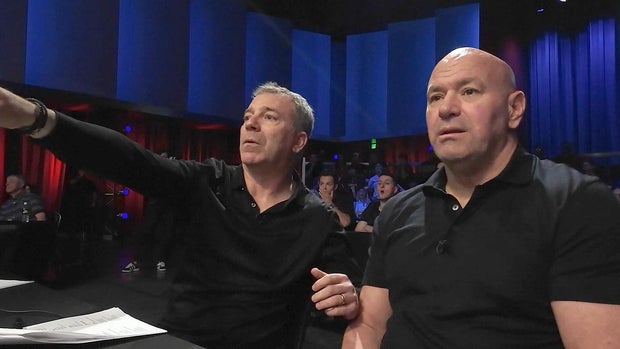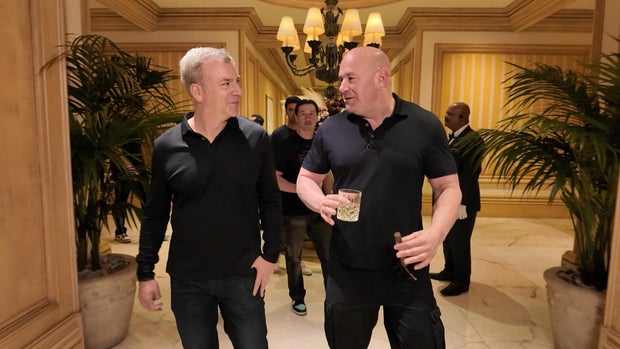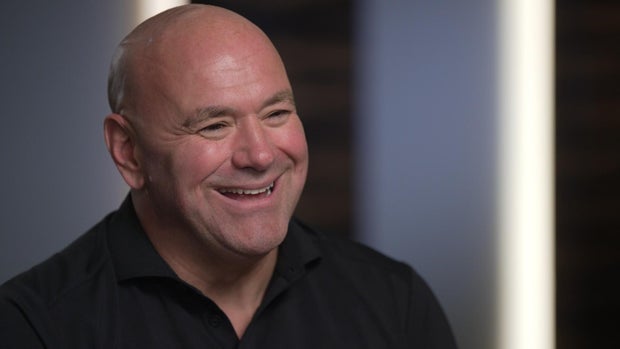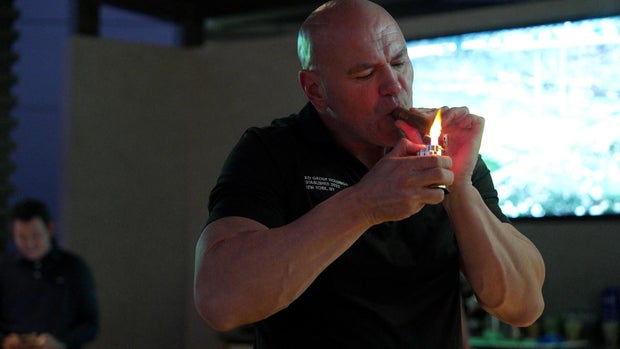Dana White on turning the UFC into a global empire and his friendship with President Trump

He holds no championship belt, but Dana White is the most prominent—and pugnacious — figure in the UFC, the Ultimate Fighting Championship. The CEO-slash-hype man is the embodiment of the league itself. Long on unapologetic force, short on precious formality, intoxicating to some, an acquired taste to others. And much like the UFC, White has penetrated the defense of mainstream culture, moving in from the fringes to join the ultra-rich, serve on the board of Meta, and befriend the current president. A small disclosure: we’ve been speaking with White for years about his appearing on this broadcast. A heavyweight disclosure: this was before Paramount Skydance, parent company of CBS, recently paid almost $8 billion for the UFC’s media rights. Yes, cage-fighting on network television, perhaps the ultimate sign of how far this sport and its no-holds-barred leader, have come.
Dana White: Wow.
Jon Wertheim: Whoa.
Tuesday night’s alright for fighting. We sat outside the octagon for Dana White’s Contender Series, a streaming show that doubles as the UFC’s farm system.
Dana White: Yeah, yeah, yeah.
60 Minutes
If the fighters entertain White — like this first round knockout artist — he rewards them with a UFC contract.
Dana White: Good fight.
Iwo Baraniewski: Thank you very much.
Dana White: Incredible.
An invitation by the big boss to the big show.
White is chief author of the greatest sports business story of this century, maybe ever.
In his 30s, he helped buy the UFC, then a renegade cage-fighting operation, for $2 million.
Now 56, he runs a global league valued at more than $15 billion, 675 fighters under contract, a brutal mash-up that includes kickboxing, wrestling and jiujitsu.
Dana White: Fire away, you know me man. You’ve known me for a long time. Fire away, I don’t give a s–t.
The entire business is built more on White’s force of personality than on a traditional playbook. We met him at UFC headquarters in Las Vegas.
Dana White: Whenever I read stories about the business of UFC, I literally laugh and say, “nobody knows anything about the business”–
Jon Wertheim: So what–
Dana White: –“side of this thing”–
Jon Wertheim: –is everyone missing?
Dana White: For 25 years people have been tryin’ to figure it out and people have been tryin’ to do it.
Jon Wertheim: Someone told me it all starts with Dana’s gut.
Dana White: That’s absolutely true. I don’t know who told you that, but that’s right.
60 Minutes
It was his gut that got him into the game. He managed boxers in Boston, then fighters in Vegas in the fledgling sport of MMA, mixed martial arts.
When White caught wind UFC’s owners were out of money, his first call went to two high school buddies, Frank and Lorenzo Fertitta, Las Vegas casino heirs.
Dana White: I said I think they’re goin’ out of business. We could probably buy this thing and we should.
The Fertittas put up the money. White got 10% but he had to run the damn thing. The UFC wasn’t just unprofitable, it was largely unsanctioned. In February 2001, White needed a home for the first fight of his regime.
Dana White: None of the venues wanted this. You know, they didn’t believe in it. They didn’t like it. And they were worried about the type of crowd that would show up for this type of event.
He found hospitality at the Taj Mahal in Atlantic City, then owned by a familiar fight fan, Donald Trump.
Dana White: When the Trump brand was here and the UFC brand was down there he– he saw it and said, “I’d love to have this at my casino.” He showed up the first prelim fight of the night and stayed till the main event was over.
Jon Wertheim: He watched the whole card.
Dana White: Watched the whole card.
Jon Wertheim: What do the balance sheets look like back in those early days?
Dana White: It was so bad that at one point Lorenzo called me and said, “Dana, I can’t keep doin’ this, man. I’m– I’m– I’m literally blowin’ all my family’s money.” And obviously that night I’m thinkin’–
Jon Wertheim: “We’re done”–
Dana White: –“It’s a wrap. This– this is over.” And he calls me the next day and literally this is what he said to me. “F**k it. Let’s keep goin’.”
So they did.
A reality series and its storylines helped draw in millions of fans. Electric match-ups —and Joe Rogan on the mic — kept it rolling.
From the beginning, White imposed his will, just ask the guys in the live TV production truck that didn’t follow his direction.
Dana White: I literally got up from my seat, went back there, and kicked the door open–
Jon Wertheim: They– they disobeyed the boss–
Dana White: –to the truck. Yeah. Kicked the door open to the truck and said, you know– I was basically like, “You ever do this again I’m firing every one of you.” Long story short, we ended up firing everybody.
60 Minutes
By 2016, the sport sanctioned in every state, the UFC sold for $4 billion, on the condition White stay on as CEO.
President Trump still routinely shows up at UFC fights, but now makes a grand entrance.
Dana White: The relationship that he and I have– and when we get together– when I have dinner with him, we don’t talk politics.
Jon Wertheim: What do you–
Dana White: –we talk about–
Jon Wertheim: –talk about–
Dana White: –goofy guy stuff that all guys talk about. You know what I mean?
Jon Wertheim: Like what?
Dana White: We talk about “Rocky” movies. We talk about different fights that have happened.
Dana White: That’s a real samurai…
White’s office is a shrine to guy stuff, the mother of all man caves.
Dana White: This is a piece of art that represents war. War is all about money.
Jon Wertheim: You once used a term with me that I quoted you on. The– the wussification of America.
Dana White: I think I said p***ification, but yeah, I get it. We’re on 60 Minutes, yeah.
Jon Wertheim: Has the pendulum swung the other way?
Dana White: I feel like it’s– it– it’s starting to.
Cage fighting has always celebrated male bravado. But White is intent that more women than ever follow the sport. He bristles at the suggestion that UFC fandom is taking on new edge.
Jon Wertheim: –you don’t think there’s this cultural movement? It’s a lotta guys– call it the Manosphere. You’re one of the leaders.
Dana White: You know when you talk about knowing your fan base, and knowing who they are?
Jon Wertheim: Who are they?
Dana White: Eighteen to 34-year-old males, and growing. We’re global. We are definitely unapologetically masculine
Jon Wertheim: Can this bubble over to too much? When– when you hear toxic masculinity, what do you–
Dana White: What’s that mean?
Jon Wertheim: You tell me.
Dana White: No, you just said it–
Jon Wertheim: When you hear it, what–
Dana White: What’s the definition of “toxic–” how– how can somebody be too masculine?
Jon Wertheim: You–
Dana White: Is that a possibility? Can you be too masculine?
Jon Wertheim: You tell me.
Dana White: No.
Jon Wertheim: Do you think so?
Dana White: The answer is, hell no.
Hang out with Dana White in Vegas and odds are good you’ll end up here, at the Bellagio.
60 Minutes
Dana White: Hi. How are you guys? Good to see you. Thank you.
Enough of a regular, he’s plied with whiskey and a cigar before heading to a private baccarat table.
Dana White: In this city, nothing is off limits.
Jon Wertheim: How much are we bettin’ here?
Dana White: $400,000.
Jon Wertheim: A $400,000 hand?
Dana White: ‘Cause these sissies won’t give me $1 million a hand.
A few hands in, fortune was not in his corner.
Dana White: God dammit… Oooh… No bueno.
Dana White: We’re down $1,240,000.
You heard right. He was down $1.2 million.
Jon Wertheim: What’s this feeding in you?
Dana White: I’m a sick, sick guy. That’s the only explanation I can give ya.
Not ten minutes later, he was cashing out, up $700,000.
Dana White: This is how we do it…
Another win for White’s instincts. His gut proved golden once again in August when Paramount Skydance outbid others, and offered the UFC $7.7 billion over seven years for U.S. media rights, putting the UFC right up there with other major sports leagues.
Jon Wertheim: You still have 10% of this enterprise?
Dana White: I have a deal here that would make Roger Goodell and every other guy go, “Holy s**t.”
Jon Wertheim: Meaning what?
Dana White: I got a damn good deal.
60 Minutes
One question that hounds White: does enough of the UFC’s big money see its way to the fighters?
The big stars can make millions per fight. But so-called bottom-of-the-card fighters are paid as little as $12,000. Earlier this year, the UFC settled a class-action antitrust lawsuit with fighters for $375 million.
Jon Wertheim: Your media rights deal basically doubled. Is fighter pay gonna increase proportionally?
Dana White: I can’t sit here right now and tell ya, you know, it’s double, it’s one and a half, it’s triple. But, yeah, fighter pay is– yeah, it’s gonna be good.
Jon Wertheim: Do you pay f– fighters a fair wage?
Dana White: Absolutely. People don’t know—how much a lot of these guys make.
Jon Wertheim: If you want to know what LeBron James makes, it’s two keystrokes away.
Dana White: We’re different in a lot of ways. We’re different than– than most major sports.
Another difference: in most sports, offensive speech by athletes can result in suspension. Not so, the UFC.
Jon Wertheim: Is there anything a fighter can say, tweet, do that you say, “You know what? There’ve gotta be consequences”?
Dana White: I’m a big believer in free speech, and unfortunately probably the most important speech to protect is hate speech.
Jon Wertheim: You’re not a fan of cancel culture.
Dana White: No. I hate it. On both sides. It’s like all the stuff that’s goin’ on with– with– with Charlie right now– you know, these people are goin’ out and sayin’ stuff. And, you know, you’re seein’ people gettin’ fired or kicked out of school.
Jon Wertheim: You don’t– you don’t think they should be fired.
Dana White: I think you’re a disgusting human being if you’re celebrating the death of another human being but people make mistakes and people are gonna do dumb things. I don’t like trying to destroy people’s lives– over doing something dumb.
Dana White: So we’re going to be here… on the White House lawn.
Top of mind for White, a fight card next summer.
Dana White: So, the fighters will walk out of the Oval Office to come to the Octagon.
The same man who once offered White a casino for staging the UFC, now has offered his backyard.
Jon Wertheim: What can you tell me about the card?
Dana White: Everybody wants to fight on the card.
Jon Wertheim: There’s gonna be a fight on the South Lawn of the White House, weigh-ins at the Lincoln Memorial. I still can’t believe I’m saying those words– even–
Dana White: I know–
Jon Wertheim: –an optimist like you–
Dana White: I can’t believe I’m hearin’ ’em.
This will hardly mark White’s first trip to the halls of power. At President Trump’s inauguration, he got the equivalent of a cage-side seat.
Jon Wertheim: What do you say to the fans who say, “I feel like the UFC’s taken a side”?
Dana White: I am an American citizen. Biden was my president. Trump is my president. I was at the inauguration, and I was sitting behind all the ex-presidents and there was this stuff goin’ around like, “Dana’s mad-doggin’ President Obama. President Obama turned around– the only president that did. And shook my hand, and said, “Congratulations on all your success.” And I said, “Thank you very much, Mr. President.”
Jon Wertheim: That’s what you were– people wondered what you guys–
Dana White: Yeah.
Jon Wertheim: –were talkin’ about.
Dana White: That’s what happened. I’ve never talked about that publicly. If President Obama–called and said, “Hey, I’d like to come see a fight,” we’d be like, “Yeah, buy some tickets and good luck to you,” or whatever? No. The– the sitting president or– or an ex-president of the United States wants to come to your event, you treat them with respect.
Meanwhile, White’s tent is expanding. Two weeks ago, he promoted championship boxing under the UFC umbrella.
Dana White: Almost 71,000 people. And it was the third biggest fight ever in the history of boxing.
Jon Wertheim: You’re sayin’ it went well.
Dana White: It didn’t suck.
Dana White: Enjoy yourself tonight, and have a good time.
60 Minutes
After a big fight weekend, most execs might give their staff a pat on the back.
Dana White: Relax, drink and smoke some cigars. Have a good night!
White the bluntest instrument in all of sports, threw his staff a weeknight bash.
Jon Wertheim: We asked around about you one word came up again and again. You know what it was?
Dana White: Loyal.
Jon Wertheim: Boom.
Dana White: Yeah.
Jon Wertheim: You’ve got some detractors too. You want to guess this one?
Dana White: What?
Jon Wertheim: Bully.
Dana White: Bully? Yeah, that makes sense.
Jon Wertheim: You don’t seem so bothered by that.
Dana White: Nah. I love it. Listen, if you want to be my friend, I’m the best friend you’ll ever have. You want to be my enemy? I’m really good at bein’ that too.
Produced by Nathalie Sommer. Associate producer, Kaylee Tully. Broadcast associate, Mimi Lamarre. Edited By: Sean Kelly.







